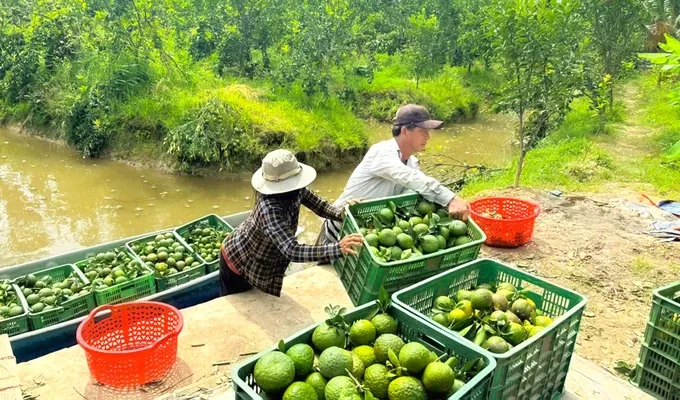
The king orange, a citrus fruit, has been cultivated periodically in the Mekong Delta for some time. However, it experienced a meteoric rise to prominence between 2013 and 2020, becoming a veritable “billion-dollar crop”.
During this period, numerous farmers, previously working the land with little more than their bare feet, transformed into prosperous individuals, with annual profits ranging from hundreds of millions to billions of VND. This surge in fortune fueled widespread aspirations of wealth through king orange cultivation.
The king orange’s allure stemmed from its adaptability to the delta’s soil, high yields, and favorable market prices (ranging from VND15,000 to over 25,000 (US$0.59-0.98) per kilogram). These factors combined to generate substantial profits, so much so that many orchard owners hastily replaced traditional crops, even resorting to leasing land at inflated prices to cultivate king oranges.
Farmer Vo Thanh Nhan from Tam Binh District of Vinh Long Province informed that prior to 2020, orange growers enjoyed exceptionally high returns, making it a veritable golden age for king oranges. After each harvest, households effortlessly earned billions of VND. Consequently, everyone transitioned to king orange cultivation, creating a rapidly spreading trend.
However, in recent years, the price of oranges has plummeted dramatically. Traders sometimes refuse to purchase the fruit, leaving growers no choice but to discard their harvest. Many have been plunged into crippling debt and forced to abandon their land. Some growers, having exhausted their capital, have attempted to secure loans using their land deeds as collateral; but banks, wary of the volatile orange market, now routinely decline such requests.
According to the agricultural development plan of the Vinh Long Provincial People’s Committee up to 2020 with a vision 2030, the province aimed to have 9,000ha dedicated to orange cultivation (an increase of just over 1,000ha compared to 2015). Nevertheless, by the end of 2024, the total area under king orange cultivation in Vinh Long had ballooned to over 18,000ha, double the approved plan. The majority of this expansion occurred in the districts of Tra On, Tam Binh, and Vung Liem.
This rapid and uncontrolled expansion of king orange cultivation, coupled with intensive farming techniques, led to a dramatic surge in production. With an average yield of 70-90 tonnes per hectare, Vinh Long Province now produces over 1 million tonnes of king oranges annually. This sudden and massive increase in supply has inevitably resulted in a market glut, driving prices down.
For several consecutive years, king oranges have fetched only a few thousand VND per kilogram, or even gone unsold, requiring “rescue efforts”. Consequently, growers have been left with a bitter taste in their mouths, far removed from the sweet taste of success they once enjoyed. Beyond shattered dreams of wealth, many orange farmers are now burdened by overwhelming debt.
It is not just Vinh Long Province but other localities in the Mekong Delta, such as Tra Vinh, Dong Thap, Tien Giang, and Ben Tre that has witnessed uncontrolled growth in king orange cultivation. Tra Vinh Province, for instance, currently has over 3,400ha of king orange cultivation, with Cau Ke District leading the province with over 2,600ha, an increase of approximately 1,200ha since 2018.
Deputy Director Le Van Dong of the Department of Agriculture and Rural Development of Tra Vinh Province explained that the sharp decline in king orange prices is due to farmers expanding production areas spontaneously and excessively, driven by short-term trends rather than adherence to local planning, resulting in a significant oversupply.
Previously, the northern market was a strong consumer, but these regions have now significantly expanded their own orange cultivation. With favorable climatic conditions, northern-grown oranges often exhibit a more appealing color and superior quality, diminishing the competitive advantage of oranges from the Mekong Delta.
Crucially, king oranges currently rely solely on domestic consumption channels, with no official export markets established. Consequently, the provincial agricultural sector advises against further expansion of king orange cultivation due to concerns about persistent oversupply.
The good news is the planting of new king orange orchards in the area has stabilized, with no further uncontrolled expansion as seen previously. This is attributed to the consecutive years of drastically low orange prices, which have made growers aware of the risks of following market trends blindly.
Looking ahead, the agricultural sector of Tra On District in Vinh Long Province is providing guidance and encouraging farmers to adopt VietGAP and GlobalGAP standards, as well as implementing planting area codes, in order to enable king oranges to meet the requirements of more discerning markets and gradually secure stable sales channels for farmers.
Despite these efforts, experts predict that king orange prices are unlikely to return to the levels seen before 2020 in the coming years. Growers are therefore advised to exercise caution when considering expanding their cultivation areas. Furthermore, the Mekong Delta currently lacks any facilities or companies investing in processing technology or the deep processing of king orange products to diversify offerings, increase value, and utilize locally sourced raw materials.
With a total output of approximately 2 million tonnes per year, this presents a significant and complex supply-demand challenge for king orange cultivation in the Mekong Delta.
























